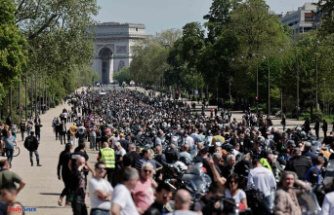Frauke Röser from the New Climate Institute has attended every climate conference since 2011. She doesn't have any great expectations of the COP27 in Sharm el Sheikh, which was supposed to end this Friday: "From COP to COP, the calls from science get louder and more urgent, but nothing happens, although it's absolutely clear that we are in an existential crisis," she says. And explains in an interview with ntv.de why she still thinks the climate conference process makes sense.
ntv.de: Foreign Minister Annalena Baerbock said that the world climate conference must send a clear signal to say goodbye to coal, oil and gas. Does it currently appear that the conference will fulfill this requirement?
Frauke Röser: No, it doesn't look like it. I think we can be happy if the resolutions that were made at the climate conference in Glasgow last year are reaffirmed, including above all the commitment to the 1.5 degree limit and the gradual move away from coal - albeit actually an exit would be necessary - and a redirection of financial flows in the direction of climate protection. India has taken the initiative to decide not only to phase down coal but also to reduce all fossil fuels, but that is no longer on the agenda. In this respect, there will probably not be a signal to say goodbye to fossil fuels.
Poor countries in Sharm el Sheikh demanded compensation for disasters caused by climate change. Is there such a rule?
I think there will be, although it remains to be seen in what form. This "loss and damage" agenda, ie the issue of damage and casualties, will be seriously addressed for the first time in Sharm el Sheikh. So far, the industrialized countries have blocked this because they feared being held liable. The poorer countries are asking for a financing mechanism and there will be progress. There must be progress if the dialogue and trust between the contracting parties is to be maintained.
From your point of view, what is the central goal that is likely to be achieved in Egypt? does that even exist?
There would be one if there were a commitment to damage and loss funding. That would be an important step in maintaining global climate diplomacy.
And what is the most serious omission?
What is still missing is the Mitigation Action Plan, i.e. a plan that focuses on avoiding further global warming. The climate targets are still massively insufficient. In Glasgow it was decided that the states would present new climate targets by this year's conference. Fewer than 30 states have done so. And for those who have done it, the goals are not even necessarily more ambitious. This is of course also due to the energy crisis and the Russian war of aggression against Ukraine. Then the climate talks between the US and China were broken off. All of this has derailed the diplomatic process it would have taken to get the national goals moving again.
But politics has been failing to protect humanity from climate change for years. Why is that?
That's what we ask ourselves as participants in this process. From COP to COP the calls of science grow louder and more urgent, but nothing happens despite the fact that we are in an existential crisis. In Germany, too, we can only maintain our prosperity if we face this crisis. The difficulty lies in the fact that this global problem can only be solved together. And because there are always states that have contributed more to climate change or could do more to protect the climate, each state can always point to others. As a result, we are only making very, very small steps forward.
Do countries with large fossil deposits even have an interest in agreements at the climate conferences? Saudi Arabia, for example, or Russia, Venezuela and the USA - isn't it in their interests to keep selling oil and gas?
This is also a sticking point: How do you move countries whose economies depend on fossil fuels to turn around? But at some point these fuels and fossil-based technologies will no longer be in demand. The transformation and the energy turnaround will take place. In this respect, such countries also have a vested interest in restructuring their economies accordingly.
What role did China play in Sharm el Sheikh? Unlike US President Biden, Xi Jinping has not traveled to Egypt.
Nevertheless, China was present in Sharm el Sheikh. The climate talks between the USA and China have now also resumed, which is an enormously important step.
The climate researcher Stefan Rahmstorf writes that at a certain point in global warming, the Greenland ice sheet will melt completely, even without further global warming - a so-called tipping point. Then there is a risk of a sea level rise of seven meters. "That tipping point is probably somewhere between 1 and 3 degrees of global warming." How certain is it anyway that we can avoid such tipping points?
We can only avoid the tipping points if we massively initiate the transformation now. We only have a few years left for that. The climate is very well researched, that climate change is a threat, there is no serious scientific doubt about that. But what exactly happens when we reach the tipping points, of which the Greenland ice sheet is just one, we don't know exactly. According to all knowledge, these tipping points lead to climate change taking on a life of its own and becoming irreversible. Global warming of 2 degrees, for example, could lead to further warming because tipping points would then be triggered, such as the thawing of the permafrost, which would then release large amounts of methane. One thing is certain: the more the earth warms up, the more difficult it will be to limit climate change and deal with the dramatic consequences.
Will it work to limit global warming to 1.5 degrees without removing CO2 from the atmosphere, i.e. without techniques like CCS, which are quite controversial?
I don't think this will be possible because the action is currently not far-reaching enough. It is important that the 1.5 degree limit must remain the target. Every tenth of a degree counts. It makes a big difference if we have global warming of 1.5 or 1.6 or 1.8 or 2 degrees. That's why we will probably need the separation technologies. However, this should be reserved for offsetting emissions for which we do not yet have emission-free technologies, i.e. in certain industrial processes and in agriculture. The danger is that the vision of separation technologies will act as a barrier to transformation, so that politicians will say: We don't have to reduce CO2 emissions so drastically, we can do CCS later. That should not happen.
The prosperity of Western societies has so far been based on constant economic growth with ever-increasing CO2 emissions. Will we have to give up wealth?
What does renunciation mean, what does prosperity mean? Do we have the right indicators to measure wealth? Is having two cars crucial to quality of life? I do think that we have to restructure our system in such a way that it is based on less consumption and growth and still at least maintains, maybe even increases, the prosperity of society. So far, this debate has been very negative. We need a rethink here.
Do you have any idea how historians will write about our time in 100 years?
If there are also historians, I can imagine that one looks back with a great deal of incomprehension and thinks: Oh my God, how could one not have seen this development? How could one not have acted with all the possibilities that existed?
You have been to every climate conference since 2011. Do these events even make sense? After all, it's the 27th conference of this kind, and UN Secretary-General Antonio Guterres nonetheless stated: "We're on a highway to climate hell and we've got our foot on the gas pedal."
Despite all the frustration, these climate conferences make enormous sense, even though Coca-Cola acted as a sponsor this year and the commitment of the Egyptian presidency was disappointing. Without climate diplomacy, without climate conferences, there would be no progress at all. This is an enormously important area, in which people talk under the most difficult geopolitical omens. Ultimately, there is simply no alternative to these climate conferences.
Hubertus Volmer spoke to Frauke Röser












